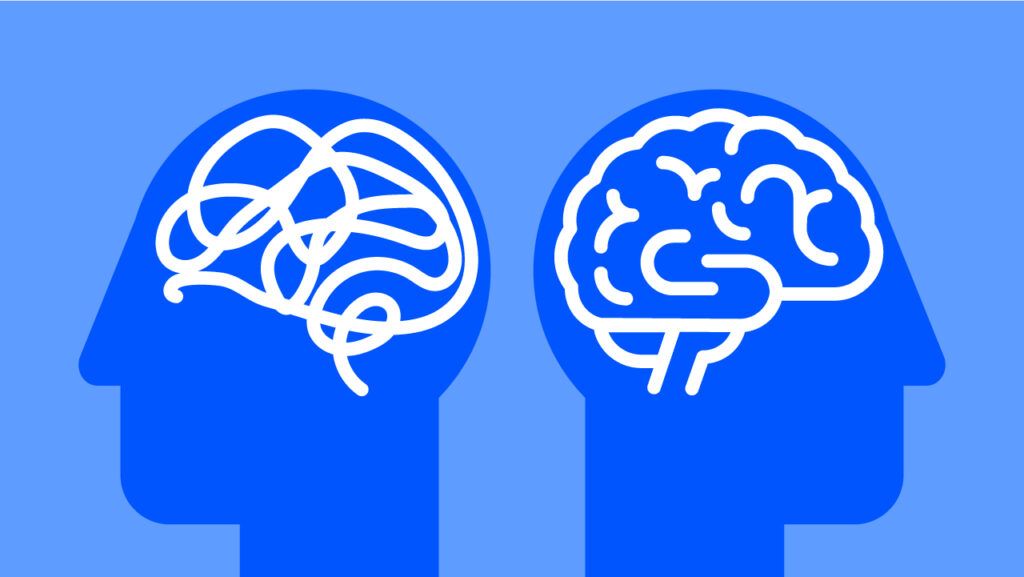
Mental health and psychosocial issues remain an under-researched yet frequent aspect of living with type 1 diabetes (T1D). As part of the JDRF-CIHR Partnership to Defeat Diabetes, JDRF is pleased to support four new Canadian grants focused on improving mental health and wellness in people with T1D. These grants are each worth $1 million over 4 years.
Having diabetes is associated with an increased risk of mental health conditions including anxiety, depression and eating disorders, as well as “diabetes distress”, which is a clinical condition that refers to the negative emotions that come with the burden of diabetes self-management.
There is some evidence that behavioral health interventions can address mental health issues such as clinical depression and diabetes distress, as well as improve quality of life and diabetes self-management in people with T1D. However, more evidence is needed, including how to best implement these interventions into practice. The four grants are focused on the development, validation and clinical implementation of mental health interventions that will ideally offer long-lasting and scalable solutions for Canadians with T1D.
—-
Aiming for something sweeter: Supporting youth with type 1 diabetes during transition from pediatric to adult diabetes care
Dr. Sonia Butalia (University of Calgary)
Dr. Butalia and her team are researching the transition from pediatric to adult diabetes care in people with T1D. This transition leaves teenagers struggling to navigate the adult health care system while also juggling increased pressures and competing priorities, such as finishing high school, navigating future plans and potentially leaving the family home, increased responsibility for their diabetes management, managing social pressures and mental health issues, to name a few. This is a crucial timepoint as inadequate transition has been found to impact psychosocial issues as well as leading to increased HbA1c values and risk of hospitalization.
Dr. Butalia and her team have previously created a transition intervention that supports teens through texting, emails, phone calls, and social media groups via non-medical transition coordinators. A pilot study of this intervention was very successful, with clinic attendance increasing 4-fold and improved blood glucose levels amongst those involved in the program. Dr. Butalia will use the JDRF-CIHR grant to expand this program to 5 major sites in Alberta and evaluate the impact of the program on participants’ mental health, diabetes management and care transition, and cost effectiveness of the program. The team will also develop a free, online toolkit that can be used by all communities across Canada to implement transition programs so that teenagers with T1D across the country can benefit.
Adaptation and pilot evaluation of a digital intervention targeting the psychosocial needs of individuals with pregestational diabetes
Dr. Deborah Da Costa (McGill University)
Pregnancy and the postpartum period are a critical life stage where persons living with diabetes may be especially vulnerable to diabetes distress, anxiety and depression because of the added physical, emotional, behavioural and social readjustments that occur, including the adjustments to a new role and new care tasks. Diabetes-specific distress and poor mental health during the preconception and pregnancy period can adversely impact maternal and offspring outcomes, yet research in this field has not been prioritized and limited interventions exist. Dr. Da Costa and her team are experts in maternal mental health and have previously developed a successful digital intervention for pregnant and postpartum women and birthing persons. They will now use the JDRF-CIHR grant to collaborate with diabetes experts – primarily those living with T1D and T2D – to adapt their platform for women and birthing persons with pregestational diabetes.
Dr. Da Costa will use a community-based participatory research approach to adapt their existing platform (HealthyMoms) for the diabetes community. This research approach ensures that the intervention is created by the community, for the community. The new adaptation – HealthyMoms DM+ – will be evaluated to determine its impact on mental health outcomes in people with pregestational diabetes (i.e., T1D or T2D prior to becoming pregnant) who are planning to become pregnant, are currently pregnant, or are in the 1-year postpartum period. This intervention will fill an important gap in current healthcare and web-based resources targeting the prevention of maternal psychological difficulties for those with pregestational diabetes. Promoting maternal health through tailored, preventive action has the potential to have a positive impact on parental, infant, and family outcomes across Canada.
Type 1 Diabetes, Exercise and Mentoring (TEAM) Trial: Peer mentorship to increase physical activity and quality of life in adolescents with type 1 diabetes
Dr. Jonathan McGavock (University of Manitoba)
Dr. McGavock and his team are focused on improving empowerment, resiliency, and autonomy in adolescents with T1D through physical activity. Despite physical activity being a crucial component of T1D management, essential for optimal quality of life, and a significant factor in mental health, daily physical activity levels remain low in adolescents with T1D. Dr. McGavock and his team will harness the effectiveness of peer-to-peer support and mentorship to create a behavioural intervention for adolescents with T1D. This program will provide strategies to address the three biggest barriers to physical activity in adolescents with T1D: (1) the increased risk and fear of hypoglycemia, (2) the trial and error to finding appropriate physical activity levels to maintain stable diabetes control, and (3) the limited motivation to exercise due to diabetes distress and existing mental health issues.
Dr. McGavock and his team will conduct a 12-week program of group-based exercise led by mentors with T1D that are living healthy, active lifestyles. This program will seek to impart upon the participants a sense of mastery, relatedness and connection with peers, and a sense of autonomy to improve their quality of life through healthy, active lifestyles. The feasibility of this study, as well as the impact on mental health and diabetes outcomes, will help inform future physical activity guidelines for adolescents with T1D.
Find Your CommuniT1D: Customized Virtual Peer Support for People Living with Type 1 Diabetes
Dr. Holly Witteman (Université Laval)
Using a unique approach, Dr. Witteman and her team will create a sustainable peer support program that is led by people with T1D, to improve the mental health and quality of life of people with T1D across Canada. CommuniT1D will be a virtual community led by people with T1D and supported by the research team who bring expertise in mental health, diabetes care, psychology, and social support. This program is intended to continuously adapt to the needs of the community, while the research will focus on the feasibility and acceptability of the program as well as its impact on diabetes distress, quality of life, well-being, diabetes management, and use of resources.
CommuniT1D will be an ongoing virtual community that includes recurring small group meetings as well as large webinars. The small group meetings will foster relatedness while providing emotional and informational peer support. Peer leaders will be trained to moderate these meetings for people with T1D who share common characteristics or situations (for example, preferred language, ethnocultural group, stage of life, hobbies/interests, etc.). The large webinars will be planned for the community to deliver T1D-related information and hear from expert speaks on topics such as: depression and anxiety with T1D, better sleep with T1D, disordered eating in T1D, meditation and mindfulness tools, financial advice, caring for loved ones with T1D, etc. Stay tuned for more information on how you can be part of CommuniT1D.
——–
JDRF has a fulsome mental health and diabetes strategy, and these grants are part of this overall aim to improve the mental health of Canadians living with T1D.
Once in recruitment phase, we will post information on how to be part of these, and other, studies in our ‘Participate in Research’ page




